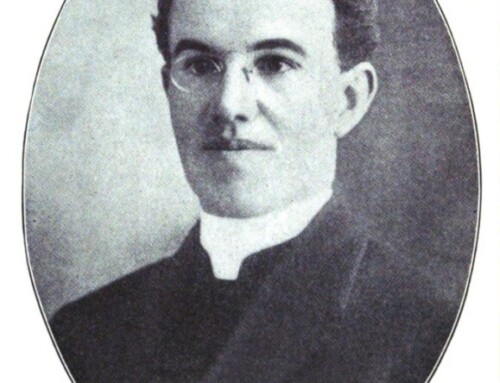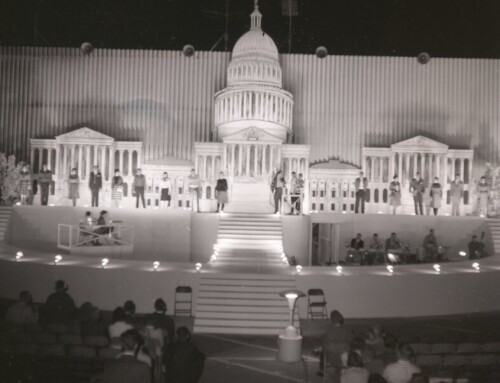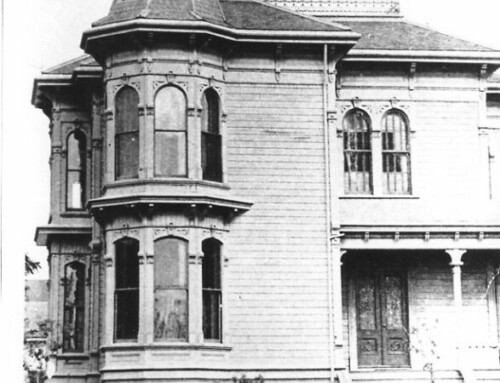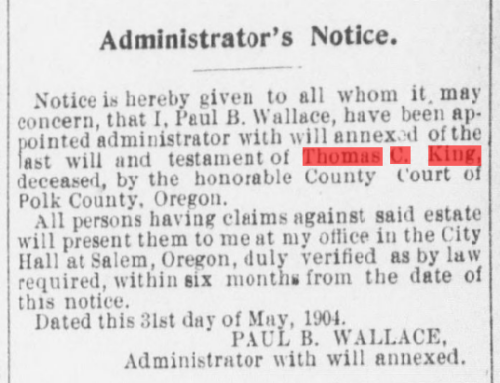I was reminded recently at the funeral of a loved one, of a simple phrase that carries special meaning in my family, “when our ship comes in.” As the phrase was repeated in a family story retold during the eulogy, my mind drifted to local history and wondered perhaps, if the story could be documented. With a little bit of research, the following intertwined tale unfolded.
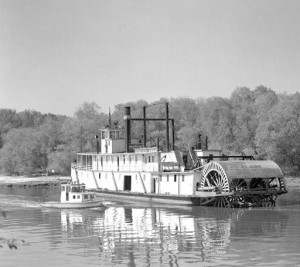
Steamboat Claire on the Willamette River near Wilsonville, Oregon. WHC 2004.010.0836
It began with the building of a steamboat named Claire. Built in 1918, the wooden hulled boat was assembled from parts of other boats long retired. Her steering lever was salvaged from the Elmore and her distinctive deep-throated whistle from the second Hassalo. At a length of 157 feet and a width of 34 feet she was built for towing on both the Willamette and Columbia Rivers. By the time of her retirement in 1952 she was the last operative steamboat on the upper Willamette able to navigate through the locks at Oregon City.
Seven years before she was built, the father of our story William Boyd Fergus was born in land-locked Garland, Utah. He married Cleone Cutler on June 27, 1935 at the height of the Great Depression. Their honeymoon was spent in a humble sheep wagon in the mountains near Black Pine, Idaho where Boyd worked cutting fence posts. Then they moved in with Boyd’s family. In 1937, their first child Darwin was born.
Hoping for a better life, with a home and land of their own the family decided to take advantage of a federal program through the Farm Credit Administration and relocate to North Plains, Oregon. For the first time in their married life they had a home of their own and with funds from the government loan they were able to build a large barn and purchase the livestock they needed. Two more children joined the family, Dorothy and Howard. Boyd’s brother Marion Fergus moved to Oregon as well. Prosperity seemed just around the corner, then misfortune struck.
In 1939, a year after taking possession of the North Plains property, Boyd’s father in Idaho grew ill and died. As the eldest of his family Boyd made several trips back and forth to Idaho traveling along the original Columbia River Highway. First to keep his father’s farm running and provide for his mother and sister, then to bury his father and move his mother and sister to Oregon. While he was gone Cleo and Boyd’s brother struggled to keep the farm and growing herd of dairy cows going. Boyd’s brother proved unreliable, missing several milk pick-ups arranged by the local dairy cooperative. By 1941 the family had lost their dream. The land and buildings reverted to the government and they were forced to move to the nearby town of Roy. They became tenant farmers, and continued to move every few years.
During World War II Boyd picked up an extra job in the Kaiser shipyards in Portland. The family felt more prosperous for a time despite rationing and other wartime restrictions. Two more children were added to the family, Monty and Gary. When the war ended, Boyd was laid off and answered an ad in the newspaper for a herdsman for Rivercrest Jersey Farm and dairy outside Wilsonville, Oregon. The Rivercrest Jersey Farm was a hobby farm for a rich Portland radio executive that bred Jersey cows for the high concentration of butterfat in their milk. The job came with a rather mercurial, cantankerous boss and a drafty two-story house that had the dubious reputation of being struck by lightning numerous times throughout its history. But it did have a beautiful view of the Willamette River.
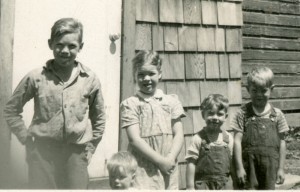
Fergus children (left to right) Darwin, Gary, Dorothy, Monty, and Howard on Rivercrest Jersey Farm. Photo shared by Fergus family.
So, what does this have to do with the steamboat Claire? Throughout the years, in answer to the children’s pleas to go somewhere or buy something, one of Boyd’s oft-repeated answers was that they could do that someday “when his ship came in.” No money for shoes to start school with? As soon as his ship came in, they’d be able to afford them. It’s not hard to imagine the young family around the dinner table sharing dreams of what they would buy once their father’s ship came in.
Imagine the children’s surprise and excitement one day, when they spotted the largest ship they had ever seen on the river below their house. The date was June 30, 1952 and the ship, the steamboat Claire. A veteran of 34 years on the river, Claire made her retirement voyage that day from Portland to Champoeg, en route to the Veteran Steamboatmen’s Association annual picnic. Her retirement marked the end of 101 years of steam boating on the upper Willamette River.
The children ran for their father, yelling “Daddy, our ship’s come in, our ship’s come in!” Surprise turned to shock and then sadness as the father gathered his little ones and explained what the saying really meant. All five children did a bit of growing up that day as childhood dreams were lost to the reality of a harsh world. And a family story was born. Carried down to this day and shared as a reminder of every parent’s hope and dreams of a better life for their children.
This article was written by Kaylyn F. Mabey for the Statesman Journal where it was printed 21 January 2018. It is reproduced here with sources for reference purposes.
References:
- “River Steamboat Days Recalled at Reunion”, Ben Maxwell, Daily Capital Journal (Salem, OR) June 30, 1952 p. 1,5
- Boyd & Cleo Fergus Family History, Kaylyn Fergus Mabey, in possession of author.



